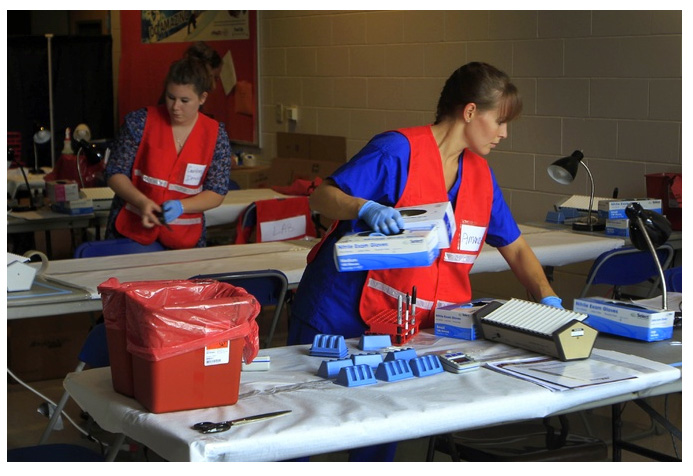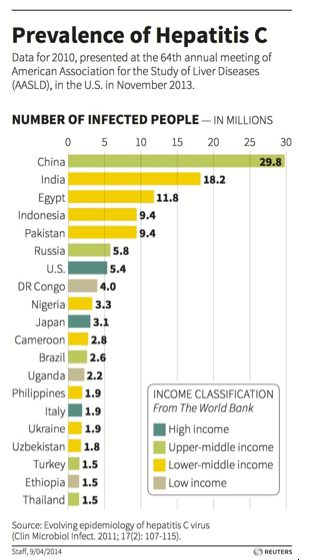| |
Sovaldi Global Access
|
| |
| |
Sofosbuvir (Sovaldi) - Gilead U.S. Patient Assistance Program
"Global Availability: Gilead is committed to helping ensure access to Sovaldi in resource-limited settings. The company is developing a hepatitis C treatment access program, focusing on those countries with the greatest HCV burden. Full program details will be announced in the coming months.
"
$1,000-a-Day Hepatitis C Miracle Drug Gets a Major Price Cut, Just Not In the U.S.

Health department workers in New Hampshire set up a temporary clinic to handle a hepatitis C outbreak in 2012. (AP PHOTO/JIM COLE)
India, Egypt and Brazil have secured access to Sovaldi, the incredibly effective, but also incredibly expensive hepatitis C treatment, for one percent of its cost in America. The 12-week treatment program that runs U.S. insurance companies $84,000 per cycle, will be just $840 in those nations. Burma, Kenya, Mozambique and Iran will pay slightly more: $900 for the full treatment program, or 1.1 percent of the standard price.
However, American insurance companies, which have bristled at the price being charged by the drug's maker, Gilead Sciences, will continue to pay full freight. In fact, they will essentially be subsidizing the cost for less developed nations where need is greater, but ability to pay is far less.
The majorly reduced price will be especially beneficial to Egypt, which has one of the world's highest rates of hepatitis C infections. The government has treated more than 350,000 patients at their own expense in the last six years. Wahin Doss, a member of the National Hepatology and Tropical Medicine Institute in Egypt, spearheaded the treatment program, which had a 50% success rate. Doss was instrumental to negotiating the deal with Gilead.
While the company initially wanted a higher rate, they settled at one percent due to the size of the market: "We told them we could compensate price for volume, said Doss. "All companies want to enter Egypt because of the huge market, but we are not letting them in unless they offer good prices. We hope to treat a million patients in Egypt."
The company's reduced prices came after the World Health Organization worked with Gilead directly to help spread the drug's usage. So what determines who gets a discount and who doesn't? It's simple. Gilead admits their "global pricing model is based on a country's ability to pay."

While the countries that most need and cannot afford the drug were greatly helped, many other nations may not be able to negotiate such as low price. Isabelle Meyer-Andrieux, an advisor at Doctors Without Borders, finds that "a major concern for us is the price for middle-income countries," such as Ukraine and China. Meyer-Andrieux believes that the wealthier countries, which had a lower rate of hepatitis C infection, will earn Gilead enough to subsidize the reduced price in developing countries: "They don't have to treat so many patients to reimburse the $11 billion." Of the 130 million to 185 million people in the world with hepatitis C, about ninety percent of them reside in the world's poorest nations, as this 2013 article from the journal Science shows.
The World Health Organization hopes that with the price will be further deceased for middle income countries through tiered pricing and generic versions of the medication. So far the tiered pricing has set the British cost to $57,000 for a full treatment, Germany to $66,000 and Canada to $55,000. Though the tiered pricing certainly offers some reduction in cost, many health leaders are left unimpressed by the so-called discounts. "When you're starting from such an exorbitant price in the U.S., the price Gilead will offer middle-income countries like Thailand and Indonesia may seem like a good discount. But it will still be too expensive for many of these countries to scale up treatment", said Rohit Malpani of Doctors Without Borders.
As for the $1,000 a day American price for the extremely effective (and life-saving) medication, Gilead is holding firm that they "think the price is fair. It's a one-time cost that is your lifetime cost." In a letter on March 20, Representative Henry Waxman called for Gilead to explain their United States pricing structure to Congress, as part of an inquiry that remains ongoing.
Bloomberg News
Developing Countries Seek Lower Price for Gilead Sovaldi
By Makiko Kitamura April 11, 2014
(Corrects second paragraph to show Gilead has agreed on pricing with Doctors Without Borders, not countries.)
Developing countries are seeking to pay as little as 1 percent of the $84,000 price Gilead Sciences Inc. (GILD:US) is charging U.S. patients for its new hepatitis C drug. Wealthier countries such as Ukraine and China may not be so lucky, according to Doctors Without Borders, the nonprofit international aid group.
While Gilead said it has reached agreement with Egypt on the discounted price for its pill, Sovaldi, in countries such as Kenya, Mozambique, Myanmar and India, Doctors Without Borders will also be able to procure the drug at $900 for a 12-week course of the medicine, Isabelle Meyer-Andrieux, an adviser at Doctors Without Borders, said yesterday at a liver disease meeting in London. Governments of these countries may negotiate for this price as well, she said.
Gilead spokeswoman Amy Flood said the company has reached such a discount agreement at a national level only with Egypt. Flood declined to comment yesterday on the status of negotiations with other countries.
Egypt has one of the world's highest rates of infection of hepatitis C and has treated more than 350,000 patients at the government's expense over the last six years, said Wahid Doss of the National Hepatology and Tropical Medicine Institute in Egypt. While Gilead asked Egypt for a higher price at first, the country was able to win better terms, Doss said.
"Egypt's example shows the power of a public health approach and its large scale," said Stefan Wiktor, who leads the World Health Organization's global hepatitis program. "One of the reasons they were able to negotiate a lower price is because they have a big program."
Cost Concerns
"We are learning a lot from Egypt," Meyer-Andrieux said. "But this is only a start. A major concern for us is the price for middle-income countries" such as China and Ukraine, where 75 percent of the global population lives today.
About 150 million people worldwide are infected with the hepatitis C virus, according to the WHO, with about 2.7 million in the U.S. The disease is transmitted through the blood and can be symptomless for years before it begins to scar the liver, leading to cancer, organ failure and, eventually, a transplant.
Gilead's pricing strategy is modeled after its past experience with HIV medicines, where pricing in the U.S. and Europe has been different to what is charged in the developing world, said Gregg Alton, executive vice president of corporate and medical affairs at Foster City, California-based Gilead, the world's biggest maker of HIV medicines.
"Gilead's global pricing model is based on a country's ability to pay," Alton said in an e-mail response to questions last month.
Fair Price
In a separate interview last month, Alton said, Gilead is "very committed to making sure patients everywhere have access. As for the cost in the U.S., ''we think the price is fair. It's a one-time cost that is your lifetime cost.''
The WHO yesterday called for ''a concerted effort'' by various stakeholders to lower the cost of the drug. In addition to tiered pricing, voluntary and compulsory licensing, where generic-drug makers are given permission to produce more affordable versions of a medicine, can also help achieve affordability, the WHO said.
Gilead has been criticized in the U.S. for the price of the new medicine, with pharmacy benefit managers and insurers seeking to reduce the cost and members of Congress calling on the company to justify its price structure.
To contact the reporter on this story: Makiko Kitamura in London at mkitamura1@bloomberg.net
To contact the editors responsible for this story: Phil Serafino at pserafino@bloomberg.net
|
|
| |
| |
|
|
|